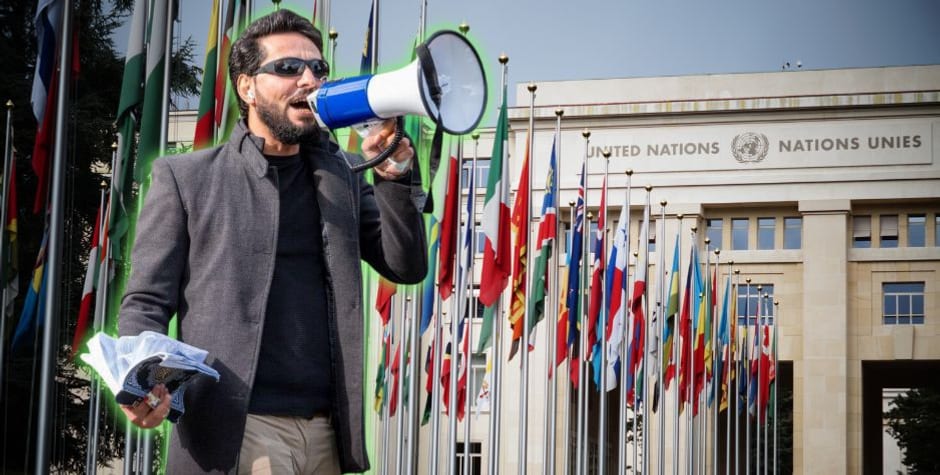

“Desecration of the Holy Quran”: Human Rights in the Service of Islam?
“Desecration of the Holy Quran”: Human Rights in the Service of Islam?
By adopting a law prohibiting the burning of the Quran in December 2023, Denmark bowed to Islamism, not so much to prevent an act against a religion permitted by freedom of expression, but rather to preserve its public order and political power. However, this submission aligns with the continuity of the UN Human Rights Council’s resolution in July 2023 condemning the ‘burning of the Quran as a religious hate act.” The proposal originated from Pakistan, sadly known for attacks and imprisonment of Christians on charges of blasphemy against Islam.
Article originally published in French in Valeurs Actuelles.
After months of heated controversy, the Danish Parliament adopted a law on December 7,2023, prohibiting “the inappropriate treatment of writings with significant religious importance for a recognized religious community.” Tearing, burning, or publicly defiling texts such as the Quran is now subject to a fine or up to two years of imprisonment. Such a law is neither novelty nor an exception.
This law is not a novelty, as Denmark already had 334-year-old provision sanctioning public insults towards religions, which was repealed in 2017. It is not an exception, as in Europe 19 out of forty-four have blasphemy laws[1], although they vary in degree, aiming to at least respect freedom of expression, which allows for criticism of religious figures and symbols but not individuals.
Fostering Religious Hatred or Opposing Religious Intolerance?
All believers should be free to practice their faith. However, an insult towards a principle or symbol of religion does not necessarily equate to insulting a person who believes in that religion. It should therefore be possible to criticize religious ideas even if such critiques can be perceived by a certain category of people as offending their religious sentiments or approaching incitement to hatred.
This is exemplified, for instance, by the Danish-born Iranian artist Firoozeh Bazrafkan, who, on August 5, 2023, shredded a Quran with a cheese grater in front of the Iranian embassy in Copenhagen, protesting the Iranian theocratic regime that deprives women of their rights and freedoms in the name of Islam. Does she deserve two years of imprisonment in a democratic country?
The Collapsing of Denmark
« Collapsing declaration », « Kneeling before Islam », « Shameful day for Denmark », « They rejoice in Teheran. Now, it is 1-0 for the Islamists », the opposition had no shortage of harsh words for this regressive « koranlov », Quran law, passed in the third reading by ninety-four out of 179 members of Parliament. During tumultuous debate lasting over four hours, no member of the Danish government spoke out to defend the proposal for this anti-blasphemy law, revived in the context of anger in several Muslim countries during the summer of 2023.
Denmark and Sweden had been the stage for a wave of Quran burnings, drawing the ire of the Organization of Islamic Cooperation (OIC), including the ransacking of the Swedish embassy in Baghdad and the expulsion of the ambassador. While Sweden stood firm, Denmark resolved to step back not out of respect for Islam but to protect its public order, national security, and economic, diplomatic, and political interests. The specter of anti-Danish violence following the publication of cartoons of Mohammed in 2005 loomed large.
Blasphemy: Caught Between Islamophobia Offense and Freedom of Expression
In reality, as explained by Grégor Puppinck, Director of the European Center for Law and Justice (ECLJ), a true legal battle has been unfolding since the late 1990s. On one side the Organization of Islamic Cooperation (OIC) introduced the notions of Islamophobia and defamation of Islam, followed by defamation of religions, recommending their condemnation under international law. On the other side, Western countries prioritize freedom of expression and oppose blasphemy offenses in the name of a liberal counter-radicalization that speaks out against traditional religions.[2]
In May 2015, as the attacks on Charlie Hebdo in Paris on January 7, 2015, reignited the debate on blasphemy offenses, the European Commission emphasized that freedom of expression “which is paramount in a democratic society, must not be scaled back in the face of extremists. The Commission also believes that “this may include criticism of religion, ideology, beliefs, institutions, including in the form of satire.”
In its 2023 report, the U.S Commission on International Religious Freedom denounced “ such laws violate freedom of religion or belief, including the right to express a range of thoughts and beliefs that others might find blasphemous; they also violate freedom of expression and promote intolerance and discrimination against minorities”.
At the United Nations: The Organization of Islamic Cooperation against liberal West
Within the United Nations, the digital influence of the fifty-seven member states of the OIC in the General Assembly and the Human Rights Council enables them to pass resolutions openly protective of Islam, despite the liberal resistance from Western states and from Special Rapporteurs and the United Nations High Commissioner for Human Rights.
Following the media desecration, of a Quran in Stockholm on June 28,2023, by an Iraqi refugee opposed to the excesses of Islamic régimes, the Pakistani delegation calls for an emergency meeting at the Human Rights Council. As a result of the resolution adopted on July 12, by 28 votes ( mostly from Muslim states and China) against 12 ( from the European Union and the United States), with 7 abstentions, the Council asserts “ that it is offensive, disrespectful, a clear act of provocation and a manifestation of religious hatred to deliberately and publicly burn the Holy Quran or any other holy book with the intent to incite to discrimination” and « that this act shall be prohibited by law, in line with the obligations of States arising from international human rights law ».
Thus, the Council “condemns and strongly rejects any advocacy or manifestation of religious hatred, including recent public and premeditated acts of desecration of the Holy Quran” and calls on states to enact repressive legislation in this regard. Confusing a call to religious hatred with the freedom of expression to reject a religion, specifically the Islamic religion in this case, the Human Rights Council precisely acknowledges the retreat of human rights in the face of religious extremism.
The OIC must cast out the beam in its own eye
For the Council, the defense of the sanctity of a religion takes precedence over the rights of individuals. But how dare they sacrifice individuals who are victims of religious hatred in their flesh for the protection of a book, no matter how sacred? How can one tolerate that, under the pretext of Quran desecration, hundreds of extremist Muslims from Pakistan vandalize eighty-seven homes of Christians and nineteen churches in August 2023?
The OIC, quicker to defend burned Qurans than the million Muslim Uighurs in Chinese prisons, applauds the resolution having successfully imposed its sacred values on a de-Christianized West. Solely concerned with “the resurgence of racist movements and right-wing extremism in several regions of the world”, it has cleverly pushed for the establishment of an International Day to Combat Islamophobia. What about the 365 million Christians around the world who “suffer high levels of persecution and discrimination for their faith” (in 2023, according to a report by the NGO Open Doors) but still do not have an International Day to Combat Christianophobia?
During the 55th session of the Human Rights Council in March 2024, the ECLJ (European Center for Law and Justice) will denounce Pakistan’s attitude, pretending to believe that there a systemic problem of burned Qurans in Europe, while dozens of Christians in Pakistan are on death row on charges of blasphemy against Islam, and the Islamists attacking churches as well as innocent men and women are not held accountable.
______________
[1] Allemagne, Andorre, Autriche, Belgique, Chypre, Espagne, Finlande, Italie, Lichtenstein, Luxembourg, Moldavie, Monaco, Monténégro, Pologne, Portugal, Saint Marin, Suisse, Turquie et Ukraine. Source: Human Rights Institute
[2] In Europe, the Parliamentary Assembly of the Council of Europe (PACE) in 2007, the European Commission for Democracy through Law (known as the Venice Commission) in 2008, the Council of the European Union in 2013, and the European Parliament in 2014 expressed their opposition to the offense of blasphemy.













